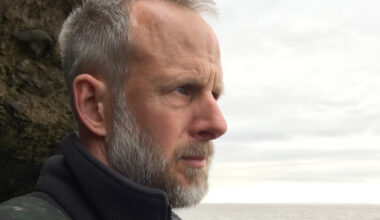With debut ‘Y Dydd Olaf’ album bagging the Welsh Music Prize, you might think that chatting on the eve of Welsh Language Music Day is the ideal time to be discussing her new release, ‘Le Kov’… except this one is sung entirely in Cornish
“I was brought up in Cardiff,” explains Gwenno Saunders, “and for a really long time I was like, ‘How is Cornish a part of me? How am I connected to this beyond my parents?’. And you are more aware of language when it’s such a small thing. If it was Spanish or French, you’d be more confident with it and then you go, ‘OK, by chance, I just so happen to have been born here speaking this. I either carry it around with me the rest of my life, this thing that I can’t fully explain, or I grab it, the bull by the horns and say, ‘Right, what is this then?’.”
Speaking to her just before Welsh Music Day seems apt, as the Cornish language is only one step behind the progress of its Cymraeg cousin. Both have survived periods of severely diminished numbers of native speakers and, like Welsh, Cornish is again on the increase.
“I made the record with Rhys [Edwards, her husband] who did the first record,” she says, explaining how the idea for ‘Le Kov’ took shape. “It was quite interesting because he’s a Welsh speaker, but he doesn’t speak Cornish. I told him I really want to make this and he was like, ‘Oh, that’s really weird, you’ll have to explain it all to me!’. Which I did, and I think he’s managed to translate it all sonically.”
Indeed, for non-speakers of the language, the initial response to ‘Le Kov’ has to be via sound alone. From the shimmering, beach-baked opening track of ‘Hi A Skoellyas Liv A Dhagrow’ (inspired by Aphex Twin’s Cornish opus, ‘Drukqs’) to the languid, bassy groove of ‘Koweth Ker’, the listener is drawn into sonic landscapes that are a joy to explore, even without a linguistic map.
“I think it helped Rhys,” explains Gwenno. “He was able to get lost in it as he wasn’t aware of these lyrical meanings. It then became about the sound of the voice, and it freed him up to do things he might not have done had he been conscious of what I was actually saying.”
But digging a little deeper into the songs reveals a series of strange tales, from doomed aviators mapping the terrain from above (‘Tir Ha Mor’), to Gruff Rhys rapping about summertime traffic jams (‘Daromres Y’n Howl’).
“A lot of it is related to landscape and imagining being in a place,” she explains. “Like ‘Den Heb Taves’ is about a man who has lost his land. And with ‘Herdhya’, I was imagining myself on Marazion Beach and looking out past St Michael’s Mount, imagining this city that would be a Cornish metropolis utopia. So I was definitely there in the mizzle and the dampness!”
There are some obvious comparisons with people like Cate Le Bon and Jane Weaver, but stylistically, it’s much more difficult to categorise – there are moments redolent of Kate Bush alongside almost Gorky’s Zygotic Mynci-esque sections of weirdness. The noise, for example, of what appears to be a piano reversing itself up some stairs and then continuing into space is just one of the things that makes ‘Daromres Y’n Howl’ so oddly captivating.
Gwenno reveals, with glee, that this was her young son bashing away on the keys and so she decided to use it in the arrangement. Perhaps this sense of the experimental, the slightly out of place and off-kilter can, like her languages, be traced back to her early family life?
“I grew up in such a Celtic household and I really didn’t have any Anglo-American music at all – no David Bowie, no Beatles, nothing – until I got into secondary school and started to get into Britpop.”
So, in the same way that English-only speakers get to have that journey of discovery with Gwenno’s records, she had similar revelations with popular culture. As people had been willing to die for their right to speak the language, her parents insisted she watch the Welsh-language TV channel S4C and nothing else.
“I was like, ‘I’d really like to watch “Top Of The Pops”,’… ‘No, you’re not allowed!’.”
The thought of being suddenly presented with a treasure trove of cultural discovery makes me a little giddy. As the interview comes to an end, I ask Gwenno one final question: for any language to be alive and of value, regardless of its beauty does it also need a purpose?
“Completely! And with Welsh-language music it was crucial that people decided, from the 1960s onwards really, ‘Right, we’re going to make popular culture in the language that we speak because otherwise who is going to care?’.”
By making ‘Le Kov’, Gwenno is fulfilling that aspect of the language, imbuing it with an artistic purpose and poetic vitality that Welsh also struggled to achieve. Perhaps her next album might be in English? Who knows, could equally be in Latin or Esperanto, but ultimately the language won’t matter – if it’s anything like her previous works, it will surely be a thing of beauty.
‘Le Kov’ is out now Heavenly






